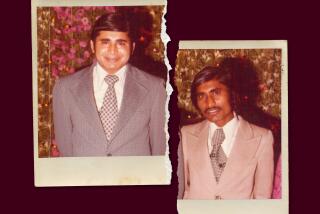Family Paid More Than the Krishnas Ever Will
- Share via
A reporter from a major East Coast newspaper asked Robin George Westerkamp: How did she feel knowing that the Hare Krishnas might lose major assets to pay the $5-million judgment she and her mother won against the religious sect?
“Doesn’t it bother you that these people might lose their temples?” she was asked.
Her response: Are you kidding?
Robin George was 14 years old and a troubled teen-ager when she left her parents’ Cypress home to join the Hare Krishnas. At a civil trial later, jurors found that the Krishnas had brainwashed her and kept her hidden from her frantic parents. They even found that her father’s fatal heart attack was related to the stress from the months he spent searching in vain across the country for his daughter.
Marsha George and Robin, after being reunited in 1977, filed the lawsuit partly in hopes it would prevent Hare Krishna conclaves from harboring other teen-agers.
It took six years for the lawsuit to come to trial. When it did, the jurors awarded the Georges $32.5 million. The trial judge reduced that to $10 million, and it has since been reduced by the appellate courts. The total now is about $5 million counting interest.
The Hare Krishnas claim they cannot pay it without selling some of their temples. But the defendant, now 30 years old and married, doesn’t buy that argument.
“They’ve spent more on lawyers’ fees fighting us than what the judgment amounts to,” she said. “They’ve had plenty of options.”
We talked last week for the first time since I had covered her trial nearly seven years ago. Much has happened to her since then.
She struggled to pay her way through design school and now is a successful interior designer. She has married; her husband is in industrial design.
Much of her life she wants to remain private. Her mother is doing well, she says, but prefers no details of her life in print. Robin asks that her own current address be kept out of public print.
“A lot of Hare Krishnas see me as a demon out to destroy them,” she said.
If the U.S. Supreme Court refuses to hear the Hare Krishnas’ appeal, it’s over. The Georges get their money. But oddly enough, Robin hopes some kind of hearing by the Supreme Court takes place.
“That kind of national exposure might help assure that the Hare Krishnas don’t harbor other teen-agers from their parents,” she said.
A couple of images come to mind from the 1983 trial:
One is of the Georges tying their daughter to the toilet bowl to prevent her return to the Hare Krishnas after she made one brief trip home. It was the only thing they knew to do.
Another is the rather surprising insensitivity among the Hare Krishna devotees in the courtroom. They fumed as we all listened to Marsha George’s testimony about her and her husband’s heartache over their missing child.
The Hare Krishnas at that time steadfastly denied any of their leaders had done anything wrong to the Georges.
But that view has been slightly altered over the past seven years. Umepati Swami, spokesman for the California Hare Krishnas, based in San Diego, made this admission last week:
“Maybe we were wrong to conceal Robin George from her parents. But concealing a child is no more than a misdemeanor, a fine of maybe four or five thousand dollars. Concealing a child is not a $5-million crime.”
Of course not. Not unless it was my child.
More to Read
Inside the business of entertainment
The Wide Shot brings you news, analysis and insights on everything from streaming wars to production — and what it all means for the future.
You may occasionally receive promotional content from the Los Angeles Times.








